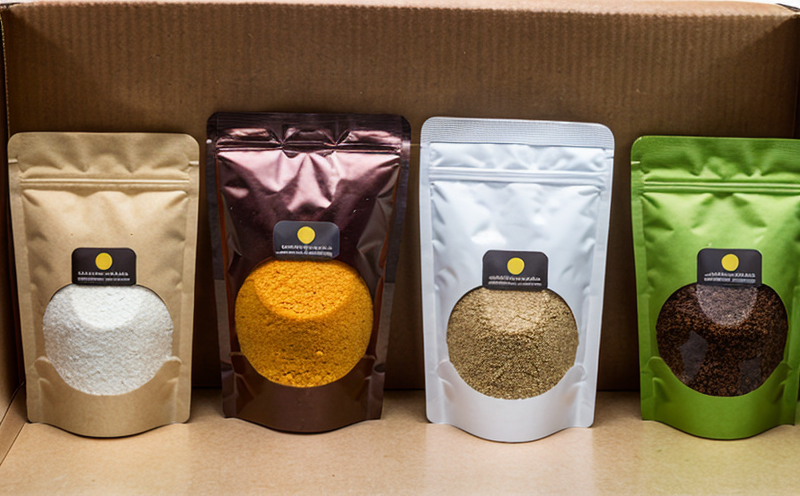Mechanical Strength Testing of Food Packaging
The mechanical strength testing of food packaging is a critical component in ensuring that products meet both safety and functional standards. This service assesses how well packaging can withstand various forces, such as compression, tension, and shear, to prevent the ingress of contaminants or the leakage of contents. The integrity of food packaging directly impacts consumer health and satisfaction by protecting the product from damage during transport and storage.
Food contact materials and packaging are subject to rigorous testing protocols that comply with global regulatory standards like ISO, ASTM, EN, and IEC. Compliance is essential for brands aiming to avoid recalls or legal issues associated with unsafe products. The mechanical strength test evaluates whether the packaging can maintain its structural integrity under typical handling conditions.
The testing process involves selecting appropriate specimens based on their intended use in food contact applications. Specimens are subjected to controlled stress using specialized equipment such as universal testing machines, tensile testers, and compression testers. These devices apply forces that simulate real-world scenarios like stacking, dropping, or squeezing during shipping and handling.
Once the test is complete, technicians analyze the results according to predefined acceptance criteria established by regulatory bodies. Acceptance criteria typically include specific limits on elongation at break, tensile strength, and modulus of elasticity. Compliance with these standards ensures that food packaging meets both performance expectations and safety requirements.
A robust mechanical strength testing program helps companies identify potential weaknesses early in the product development cycle. By identifying issues before they become widespread problems, businesses can implement corrective actions more efficiently, reducing costs associated with rework or recalls. Furthermore, consistent adherence to these tests supports brand reputation by demonstrating a commitment to quality and safety.
For quality managers and compliance officers responsible for ensuring regulatory compliance across multiple jurisdictions, mechanical strength testing provides peace of mind knowing that their products meet stringent requirements. R&D engineers benefit from this service as it offers valuable insights into material properties and potential design improvements. Procurement teams also find value in this offering since it allows them to source materials confidently based on proven performance metrics.
It is important to note that mechanical strength testing goes beyond just physical attributes; it encompasses the overall durability of packaging components when exposed to environmental factors such as temperature variations, humidity levels, and exposure to sunlight. These variables can significantly impact the longevity and effectiveness of food contact materials over time.
Quality and Reliability Assurance
- Precise measurement and control throughout every stage of testing ensure consistent results.
- Compliance with international standards guarantees adherence to industry best practices.
- In-depth analysis provides actionable insights for continuous improvement efforts.
The mechanical strength test is a crucial step in maintaining the quality and reliability of food packaging. By ensuring that each specimen meets strict criteria, this process helps manufacturers maintain consistent product performance across batches. Compliance with international standards such as ISO 10346, ASTM D882, EN 973, and IEC 61967 ensures alignment with global regulatory requirements.
In-depth analysis of test data allows for identification of trends or areas requiring improvement. This information is invaluable in driving continuous quality initiatives aimed at enhancing overall product reliability. For instance, if certain types of packaging consistently show lower than expected mechanical strength, companies can explore alternative materials or manufacturing processes to address these issues proactively.
Environmental and Sustainability Contributions
- Eco-friendly materials: By selecting sustainable alternatives for food contact applications, manufacturers can significantly reduce their environmental footprint.
- Reduced waste: Properly designed packaging that meets mechanical strength requirements helps minimize unnecessary disposal by extending product life cycles.
The mechanical strength testing of food packaging plays a vital role in promoting sustainability within the consumer products sector. One key aspect is the use of eco-friendly materials, which not only enhance durability but also contribute positively to environmental protection efforts. These sustainable options include biodegradable plastics made from plant-based ingredients and recycled content paperboard.
Another significant contribution lies in reducing waste through proper design practices. Packaging that withstands mechanical stresses without compromising on functionality helps extend the useful life of containers, thereby decreasing the amount of discarded materials sent to landfills. By optimizing material thicknesses and structural designs, manufacturers can achieve optimal balance between strength and environmental friendliness.
Use Cases and Application Examples
| Application Example | Description |
|---|---|
| Stainless Steel Containers | Evaluating the resistance of stainless steel containers to high pressure during filling processes. |
| Plastic Bottles | Determining the impact strength and tensile properties of plastic bottles when exposed to various temperatures. |
| Paperboard Boxes | Assessing the compression resistance of paperboard boxes used for transporting perishable goods like fruits or vegetables. |
| Breathable Films | Measuring the puncture strength and tear resistance of breathable films used in packaging moisture-sensitive products such as pharmaceuticals. |
| Metal Foils | Testing the peel strength between layers of metal foils commonly found in multi-layered containers for shelf-stable beverages. |
This table illustrates various scenarios where mechanical strength testing plays an integral role. Stainless steel containers must endure high pressures during filling operations without compromising their integrity, while plastic bottles require robust impact and tensile properties to withstand different temperatures throughout distribution channels. Paperboard boxes need strong compression resistance to protect fragile items like fruits or vegetables during transit.
Breathable films used in packaging moisture-sensitive products such as pharmaceuticals should demonstrate excellent puncture strength and tear resistance to maintain product freshness. Lastly, metal foils often have multiple layers separated by adhesives; testing their peel strength ensures proper separation when opening the container without damaging its contents.





